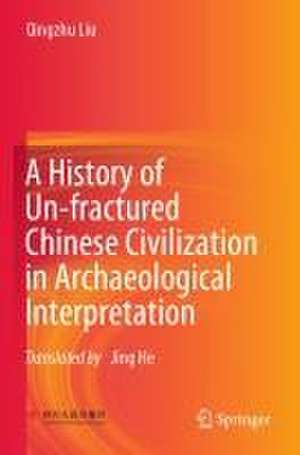A History of Un-fractured Chinese Civilization in Archaeological Interpretation
Autor Qingzhu Liu Traducere de Jing Heen Limba Engleză Paperback – 26 feb 2024
| Toate formatele și edițiile | Preț | Express |
|---|---|---|
| Paperback (1) | 653.29 lei 38-44 zile | |
| Springer Nature Singapore – 26 feb 2024 | 653.29 lei 38-44 zile | |
| Hardback (1) | 750.06 lei 22-36 zile | |
| Springer Nature Singapore – 25 feb 2023 | 750.06 lei 22-36 zile |
Preț: 653.29 lei
Preț vechi: 859.59 lei
-24% Nou
Puncte Express: 980
Preț estimativ în valută:
125.00€ • 130.87$ • 103.43£
125.00€ • 130.87$ • 103.43£
Carte tipărită la comandă
Livrare economică 02-08 aprilie
Preluare comenzi: 021 569.72.76
Specificații
ISBN-13: 9789811939488
ISBN-10: 9811939489
Pagini: 540
Ilustrații: XI, 540 p. 443 illus., 344 illus. in color.
Dimensiuni: 155 x 235 mm
Ediția:2022
Editura: Springer Nature Singapore
Colecția Springer
Locul publicării:Singapore, Singapore
ISBN-10: 9811939489
Pagini: 540
Ilustrații: XI, 540 p. 443 illus., 344 illus. in color.
Dimensiuni: 155 x 235 mm
Ediția:2022
Editura: Springer Nature Singapore
Colecția Springer
Locul publicării:Singapore, Singapore
Cuprins
Chapter 1 Introduction: Interpreting “China’s Un-fractured Civilization of 5000 Years”.- Chapter 2
Archaeological Discoveries and Studies on Capital Cities.- Chapter 3 Archaeological Discoveries and Studies on Emperors’ Mausoleums.- Chapter 4 Ritural Architecture, Sacrificial Objects and the Written Language.- Chapter 5 The Concept of “zhong he” and National Identity.
Notă biografică
Qingzhu Liu, professor, doctoral supervisor, and archeologist, graduated from the Department of History of Peking University in 1967 with a major in Archeology and is currently a member of the Chinese Academy of Social Sciences; member of the Academic Advisory Committee of the Chinese Academy of History; member of the National Advisory Committee of Experts in Philosophy and Social Sciences of China; the director of the Academic Committee of the Chinese Yanhuang Culture Research Association; the dean of the School of History at Zhengzhou University; the dean of the Research Institute of Central Plains History and Culture; and a corresponding member of the German Archeological Institute. He has authored books such as Archaeological Studies of Ancient Capitals and Emperors’ Mausoleums, The Eleven Tombs of the Western Han Dynasty, History of Chang’an, etc., and academic theses such as “The History of China’s Territory in the View of a Unified Multi-Ethnic Country,” etc. His work The Weiyang-gong palace site in Han Chang’an City was honored by the Chinese Academy of Social Sciences.
Textul de pe ultima copertă
This book presents an archeological interpretation of the history of Chinese civilization. Tracing back from recent history to the distant past, it explores the breadth of Chinese civilization. Using archeological remains and cultural relics as starting points and approaching the cultural dimension from material perspectives, it presents a panoramic view of China’s civilizational continuity, together with its ideological and cultural characteristics. Featuring a wealth of illustrations (including photos of cultural relics and sites, archeological surveys, etc.) and texts written in easy-to-understand language, it offers an engaging read without sacrificing academic quality. The main components of “civilization” are addressed: capital archeology, mausoleum archeology, ritual wares and architecture archeology, as well as written language. The book offers a unique resource for archeology scholars and majors, as well as general readers who are interested in Chinese archeology and history.
Caracteristici
Explores China’s civilizational continuity on the basis of cultural relics and sites Features hundreds of high-resolution pictures, offering a panoramic interpretation Is a unique resource, prepared by a leading Chinese archeologist
